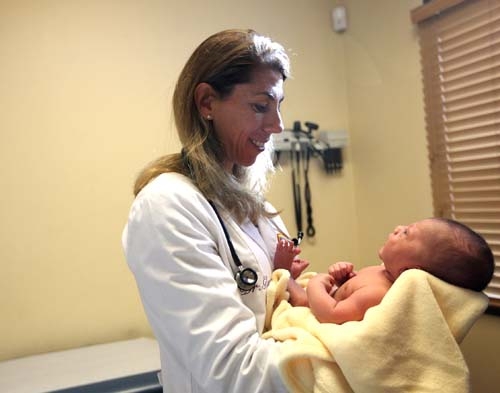Doctors, health agencies try to dispel fears about immunizations


Dr. Lisa Glasser believes it’s Andrew Wakefield’s fault.
Yes, the Henderson pediatrician blames the man who was stripped of his medical license in Great Britain for Americans becoming so concerned about the alleged side effects of the chickenpox vaccine that they are opting to buy infected lollipops over the Internet in order to give their little ones the full-blown disease and the immunity that follows naturally.
"If you introduce the kind of fear into people that he did about vaccines, then it’s difficult not to pay attention to it," Glasser said. "The fear spread and it generalizes to every kind of vaccine."
Wakefield published a 1998 study in the prestigious medical journal The Lancet that purported to show a connection between the mumps, measles and rubella vaccine and autism.
Vaccination rates around the world plummeted. Childhood diseases started to escalate for the first time in years.
Then in 2010, after years of investigation, authorities found Wakefield had faked the data as part of a scheme to make money off new medical testing. The Lancet retracted the physician’s findings.
"But it’s going to take a long time to get over the damage he did," Glasser said. "Public health officials have been terribly frustrated by that fraud."
In recent weeks, the media have relayed a Nashville television station’s report of a Tennessee woman who charged $50 to ship suckers smothered in saliva by her chickenpox-infected kids.
Other stories have reported on parents using Facebook and other social media outlets to set up "Find a Pox Party" sites.
Parties are held so that a child with chickenpox can play with children who are not sick in hopes they will also get sick and gain immunity from the disease.
Glasser, along with Brian Labus, senior epidemiologist for the Southern Nevada Health District, and Jeff Diamond, a spokesman for the federal Centers for Disease Control and Prevention in Atlanta, all say that the most effective, safe and legal way to acquire immunity from the disease is through a vaccination.
Doctors recommend the vaccine in two doses, generally within the first year to 15 months after birth and again at 4 to 6 years of age.
They note that the vaccine, which can cause allergic reactions, is much safer than getting the disease, which can, in some children, lead to pneumonia, skin infections, brain damage or death.
The virus is also more dangerous in older people.
Labus said infected lollipops aren’t likely to give kids the disease, which is normally transmitted through the respiratory system, not through oral ingestion. So, even if by some miracle the virus survived going through the mail, it probably wouldn’t infect the child.
"You might get some disease from germs that do survive, though, like hepatitis, " said Diamond, also noting that federal law prohibits the sending of diseases across state lines.
In recent years, Labus said public health officials have heard of rumors of chickenpox parties being held in Las Vegas.
"Before we got vaccines, people did do that, " he said.
Diamond said the CDC is taking the news report out of Nashville seriously and is monitoring reports of pox parties. At this point, he said, the federal agency hasn’t issued warnings to health districts across the nation to investigate reports of such behavior.
Just how much the fraudulent work of Wakefield, coupled with some Americans’ distrust of government, plays a role in low vaccination rates in Southern Nevada is impossible to judge, Glasser said.
"It plays some role," she said.
The 2010 National Immunization Survey shows that Nevada ranks next to last in immunizing children age 19 to 35 months for diseases that include polio, measles, hepatitis and chickenpox.
For school-age children in Nevada, the only disease that falls below 90 percent for vaccinations is chickenpox.
With Clark County schools increasing its requirements for chickenpox immunizations this year to conform with national standards, that number should increase dramatically.
According to Glasser, once the vaccination goes below 90 percent, "we can start to see the re-emergence of the disease in the community.
Labus noted that people can get exempted from vaccinations for religious or medical reasons, but "not for philosophical reasons."
"If a family sees that one child has a terrible reaction to some vaccination, it makes sense not to try it on another child," he said.
Government records show that 82 children have been exempted from vaccinations in Southern Nevada this year.
The CDC’s Diamond said he hates to see people refusing to have children vaccinated. Already, this year, he said, there have been 225 case of measles.
"It’s extraordinarily frustrating," he said. "We have some of the most brilliant scientists in the world trying to knock these diseases out, and our best efforts are undermined by cynicism and Internet rumor."
Contact reporter Paul Harasim at pharasim@reviewjournal.com or 702-387-2908.
Kindergarten Immunization SurveyPercentage of kindergarters who were immunized against various diseases as of the first day of school for the 2010-2011 school year.
Disease, Nevada, National Average
• Polio, 98.9, 95.8
• Diphtheria, 98.2, 95.3
• Tetanus, 98.2, 95.1
• Pertussis, 98.2, 95.1
• Measles, mumps, rubella, 94.6, 94.8
• Hepatitis B, 98.1, 96.5
• Varicella (chickenpox), 76.9, 93.7*
* National standards require two doses of the varicella immunization. Until this fall, the Clark County School District required only one dose of the vaccine while the rest of the state required two. That is expected to push Nevada above the national average in future kindergarten immunization surveys.
Source: Nevada State Health Division












